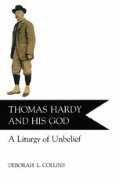Abstract
Many a bourgeois sensibility was offended by Hardy’s ruminations concerning the nature of God. While it might seem unlikely that he could further alienate the reading population, the speculations offered by his third voice achieved just that. At least fifty modern meanings attach to the word ‘God’, this voice suggests, and it is therefore deceptive to ‘call any force above or under the sky by the name of “God” — and so pass as orthodox cheaply, and fill the pocket’.2 Never one to economise by filling his pocket with ersatz happy endings, Hardy argues that the only reasonable translation of the term for and concept of ‘God’ is ’the Cause of Things, whatever that cause may be’.3 His implication that all modern thinkers are necessarily ‘atheists in the ancient and exploded sense’4 caused his critics to bristle at such audacity. G. K. Chesterton counter-accused Hardy of being a disillusioned, depressed, blasphemous ‘village atheist’ who invented the First Cause in order to ‘give it a piece of his mind’;5 Carl Van Doren concurred that ‘Whatever Mr. Hardy’s conceptions, he demands some responsible deity upon whom he can lay the blame for the crass casualties which he encounters’.6
The old theologies may or may not have worked for good in their time. But they will not bear stretching further in epic or dramatic art. The Greeks used up theirs; the Jews used up theirs; the Christians have used up theirs. So that one must make an independent plunge, embodying the real, if only temporary, thought of the age. But I expect that I shall catch it hot and strong for attempting it!1
Access this chapter
Tax calculation will be finalised at checkout
Purchases are for personal use only
Preview
Unable to display preview. Download preview PDF.
Notes and References
Florence Emily Hardy, The Life of Thomas Hardy (London: Macmillan; New York: St Martin’s Press, 1962), p. 319.
G. K. Chesteron, ‘Great Victorian Novelists’, in The Victorian Age in Literature (London: William & Norgate; New York: Holt, 1913), p. 144.
Carl Van Doren, ‘Anatole France and Thomas Hardy’, Century Magazine, ns, 87 (1925), p. 422.
Thomas Hardy, ‘Fragment’, in Variorum Edition of The Complete Poems of Thomas Hardy, edited by James Gibson (London: Macmillan, 1979; New York: Macmillan, 1979), pp. 513–14.
T. H. Huxley, ‘Evolution and Ethics’, in Touchstone for Ethics, 1893–1943, by T. H. and Julian Huxley (London: Harper & Bros, 1947), p. 91–2.
Thomas Hardy, The Collected Letters of Thomas Hardy, edited by Richard Little Purdy and Michael Millgate (Oxford: Clarendon Press, 1980), V, p. 50.
J. O. Bailey, Thomas Hardy and the Cosmic Mind (Chapel Hill: University of North Carolina Press, 1956), p. 14.
Thomas Mann, ‘Presenting Schopenhauer’, in Schopenhauer: His Philosophical Achievement, edited by Michael Fox (Brighton: Harvester Press, 1980), p. 6.
Arthur Schopenhauer, The World as Will and Idea, translated by R. B. Haldane and J. Kemp (London: Kegan Paul, Trench, Trubner, 1906), I, p. 141.
Pierre d’Exideuil, The Human Pair in the Work of Thomas Hardy, translated by Felix W. Crosse (Port Washington, New York: Kennikat Press, 1970), p. 209.
Eduard Von Hartmann, Philosophy of the Unconscious, translated by William Chatterton Coupland (London: Kegan Paul, Trench & Trubner, 1893), III, p. 125.
J. Hillis Miller, The Disappearance of God (Cambridge, Mass.: Harvard University Press; London: Oxford University Press, 1963), p. 2.
T. E. Lawrence, Letters of T. E. Lawrence, edited by David Garnett (New York: Doubleday, Doran, 1939), pp. 429–30.
Thomas Hardy, The Dynasts, (London: Macmillan, 1923), pp. viii-ix.
Harold Orel, Thomas Hardy’s Epic Drama: A Study of The Dynasts (New York: Greenwood Press, 1969), pp., 70–1.
Lionel Stevenson, ‘Thomas Hardy’, in Darwin Among the Poets (Chicago: University of Chicago Press; London: Oxford University Press, 1932), p. 296.
Edmund Blunden, Thomas Hardy (London: Macmillan, 1941), p. 229.
Richard Dawkins, The Selfish Gene (London and New York: Oxford University Press, 1978), p. 63. (Dawkins, The Blind Watchmaker (London: W. W. Norton, 1986)).
Author information
Authors and Affiliations
Copyright information
© 1990 Deborah L. Collins
About this chapter
Cite this chapter
Collins, D.L. (1990). The ‘Great Adjustment’: Evolutionary Meliorism in The Dynasts. In: Thomas Hardy and his God. Palgrave Macmillan, London. https://doi.org/10.1007/978-1-349-11365-1_4
Download citation
DOI: https://doi.org/10.1007/978-1-349-11365-1_4
Publisher Name: Palgrave Macmillan, London
Print ISBN: 978-1-349-11367-5
Online ISBN: 978-1-349-11365-1
eBook Packages: Palgrave Literature & Performing Arts CollectionLiterature, Cultural and Media Studies (R0)

